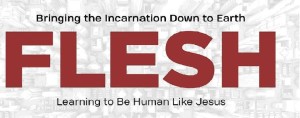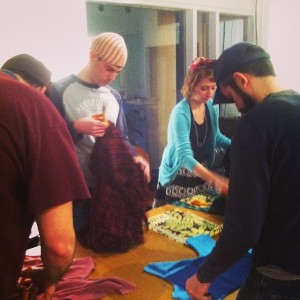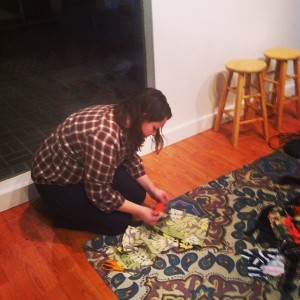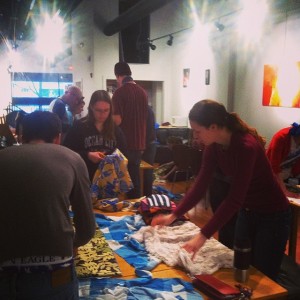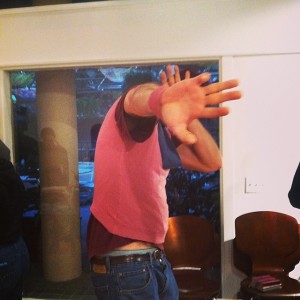 So today we begin a 4 week series, running about 2/3 through the Christian season of Lent (which by the way starts this Wednesday with Ash Wednesday…and is when you can start your 40 Day Draw the Circle Prayer book experience…if you ordered one. I do have around 3 extra if you want one). This 4 week series is entitled The Circle Maker and we’ll be looking at questions like this: Do you ever sense that there’s far more to prayer to and to God’s vision for your life, than what you are experiencing? What if you could pray circles around your biggest dream and great fear? So we’ll be spending 4 weeks talking and praying and circling our lives, our families, our friends, our community in prayer. We’ll spend time next week, before the gathering from 10-10:20 at our prayer gathering, and would love to see you there. We will also be meeting at the end of the month at 9 AM to do some prayer circling or prayer walking around the city. (I’ll say more about that as we get closer to the day)
So today we begin a 4 week series, running about 2/3 through the Christian season of Lent (which by the way starts this Wednesday with Ash Wednesday…and is when you can start your 40 Day Draw the Circle Prayer book experience…if you ordered one. I do have around 3 extra if you want one). This 4 week series is entitled The Circle Maker and we’ll be looking at questions like this: Do you ever sense that there’s far more to prayer to and to God’s vision for your life, than what you are experiencing? What if you could pray circles around your biggest dream and great fear? So we’ll be spending 4 weeks talking and praying and circling our lives, our families, our friends, our community in prayer. We’ll spend time next week, before the gathering from 10-10:20 at our prayer gathering, and would love to see you there. We will also be meeting at the end of the month at 9 AM to do some prayer circling or prayer walking around the city. (I’ll say more about that as we get closer to the day)
So for the next 4 weeks we will be exploring the idea of being a Circle Maker. And so to truly understand what it means to be a circle maker we need to learn about the first Circle Maker, and the legend of Honi the Circle Maker.
It was the first century BC and a devastating drought threatened to destroy a generation, the generation before Jesus. The last of the Jewish prophets had died off nearly four centuries before. Miracles were such a distant memory that they seemed like a false memory. And God was nowhere to be heard. But there was one man, an eccentric sage who lived outside the walls of Jerusalem, who dared to pray anyway. His name was Honi. And even if the people could no longer hear God, he believed that God could still hear them.
When rain is plentiful, it’s an afterthought. During a drought, it’s the only thought. And Honi was their only hope. Famous for his ability to pray for rain, it was on this day—the day—that Honi would earn his moniker.
With a six-foot staff in his hand, Honi began to turn like a math compass. His circular movement was rhythmical and methodical. Ninety degrees. One hundred and eighty degrees. Two hundred and seventy degrees. Three hundred and sixty degrees. He never looked up as the crowd looked on. After what seemed like hours, but had only been seconds, Honi stood inside the circle he had drawn. Then he dropped to his knees and raised his hands to heaven. With the authority of the prophet Elijah who called down fire from heaven, Honi called down rain.
“Lord of the Universe, I swear before your great name that I will not move from this circle until you have shown mercy upon your children.”
The words sent a shudder down the spine of all who were within earshot that day. It wasn’t just the volume of his voice. It was the authority of his tone. Not a hint of doubt. This prayer didn’t originate in the vocal chords. Like water from an artesian well, the words flowed from the depth of his soul. His prayer was resolute yet humble; confident yet meek; expectant yet unassuming.
Then it happened.
As his prayer ascended to the heavens, raindrops descended to the earth. An audible gasp swept across the thousands of congregants who had encircled Honi. Every head turned heavenward as the first raindrops parachuted from the sky, but Honi’s head remained bowed. The people rejoiced over each drop, but Honi wasn’t satisfied with a sprinkle. Still kneeling within the circle, Honi lifted his voice over the sounds of celebration.
“Not for such rain have I prayed, but for rain that will fill cisterns, pits, and caverns.”
The sprinkle turned into such a torrential downpour that eyewitnesses said no raindrop was smaller than an egg in size. It rained so heavily and so steadily that the people fled to the Temple Mount to escape the flash floods. Honi stayed and prayed inside his protracted circle. Once more he refined his bold request.
“Not for such rain have I prayed, but for rain of Thy favor, blessing, and graciousness.”
Then, like a well-proportioned sun shower on a hot and humid August afternoon, it began to rain calmly, peacefully. Each raindrop was a tangible token of God’s grace. And they didn’t just soak the skin; they soaked the spirit with faith. It would be forever remembered as the day. The day thunderclaps applauded the Almighty. The day puddle jumping became an act of praise. The day the legend of the circle maker was born. It had been difficult to believe the day before the day. The day after the day, it was impossible not to believe.
Honi was celebrated like a hometown hero by the people whose lives he had saved. But some within the Sanhedrin called the Circle Maker into question. A faction believed that drawing a circle and demanding rain dishonored God. Maybe it was those same members of the Sanhedrin who would criticize Jesus for healing a man’s withered arm on the Sabbath a generation later. They threatened Honi with excommunication, but because the miracle could not be repudiated, Honi was ultimately honored for his act of prayerful bravado.
The prayer that saved a generation was deemed one of the most significant prayers in the history of Israel. The circle he drew in the sand became a sacred symbol. And the legend of Honi the circle maker stands forever as a testament to the power of a single prayer to change the course of history.
And so God calls his people to sometimes do what might seem strange to others in order to live out his Kingdom in this world. Like drawing a circle, kneeling in it, and praying until it rains. Or the strange call that God gave to Joshua in Joshua 6:1-16 which is the text we’ll be unpacking a bit this morning.
“Now the gates of Jericho were securely barred because of the Israelites. No one went out and no one came in. Then the Lord said to Joshua, “See, I have delivered Jericho into your hands, along with its king and its fighting men. March around the city once with all the armed men. Do this for six days. Have seven priests carry trumpets of rams’ horns in front of the ark. On the seventh day, march around the city seven times, with the priests blowing the trumpets. When you hear them sound a long blast on the trumpets, have the whole army give a loud shout; then the wall of the city will collapse and the army will go up, everyone straight in.” So Joshua son of Nun called the priests and said to them, “Take up the ark of the covenant of the Lord and have seven priests carry trumpets in front of it.” And he ordered the army, “Advance! March around the city, with an armed guard going ahead of the ark of the Lord.” When Joshua had spoken to the people, the seven priests carrying the seven trumpets before the Lord went forward, blowing their trumpets, and the ark of the Lord’s covenant followed them. The armed guard marched ahead of the priests who blew the trumpets, and the rear guard followed the ark. All this time the trumpets were sounding. But Joshua had commanded the army, “Do not give a war cry, do not raise your voices, do not say a word until the day I tell you to shout. Then shout!” So he had the ark of the Lord carried around the city, circling it once. Then the army returned to camp and spent the night there. Joshua got up early the next morning and the priests took up the ark of the Lord. The seven priests carrying the seven trumpets went forward, marching before the ark of the Lord and blowing the trumpets. The armed men went ahead of them and the rear guard followed the ark of the Lord, while the trumpets kept sounding. So on the second day they marched around the city once and returned to the camp. They did this for six days. On the seventh day, they got up at daybreak and marched around the city seven times in the same manner, except that on that day they circled the city seven times. The seventh time around, when the priests sounded the trumpet blast, Joshua commanded the army, “Shout! For the Lord has given you the city!”
Now there are a few things that I want to unpack in this text that speaks to God, the power of prayer, and the upside down ways of the Kingdom.
First we need to look at the city of Jericho. Now cities are not like the cities in our day and age. All cities were walled cities for protection of it’s people. Jericho was around a 12 acre city, with 50 foot high upper walls and 6 foot thick lower walls. An impenetrable fortress of a city. For all intensive purposes Jericho seemed to have the upper hand. A higher position, a defensible city, and the safety of the walls. From a human perspective, this would be a hard, if not impossible battle. Yet from God’s perspective, the battle was already over, because he said to Joshua, “I Have” in the past tense. it was already a done deal, the Israelites just needed to trust and live into it. This is a question that we are going to dialogue around in a little bit but what is your Jericho? What is the thing that God is calling you to be about that seems above and beyond you? What huge, God-inspired thing are you praying for and if it comes to fruition that only God can get the honor and the glory? Nothing honors God more than a big dream that is way beyond our ability to accomplish.
Now I have some issues with the book of Joshua and Judges and the conquest stories and what we do with them. But putting that aside, the thing we see here is that to call this story the battle of Jericho isn’t truly honest, because in all reality, it wasn’t much of a battle and the Israelites didn’t even fight. They just marched, prayed and worshipped and God did the rest. God could have done it without the Israelites, but he wanted them to be part of the work. But that work seemed to the Israelites (and to us) about the stupidest battle plan anyone could come up with. It made not sense according to military intelligence and it required total dependence on God. It required great faith from Joshua as he had to explain and the lead the nation in this plan. It required great faith from elders and the nations, because they had to follow Joshua in the plan. So their victory was not linked to military prowess. Victory comes from God and not their own fighting.
I mean what kind of “battle plan” is “march around the city 1 time each day for 6 days, then on the seventh day march around the city 7 times and then shout.”? To have the helplessness of Israel to march 6 days of silent marching. To have a good look at the walls that seemed to be impenetrable. They could have been attacked from the highpoint on the wall. And they knew that this “battle” was bigger than they were. But as they marched they knew God was with them. They actually did something that they had never done before, bring the priests and the ark into battle. Both the priest and the ark symbolize God’s presence in the midst of the battle. So that is another question that we need to unpack together, where have you seen God in the midst of the “battle” of life?
And so the Israelites needed to have courage and it took endurance to persist in the march for a week before seeing the walls come tumbling down. It takes courage and endurance for us to pray a huge prayer, to continue praying until it comes to fruition (if it is the Lord’s will for it to come to fruition) and to trust God to come through in his power and not ours.
After seven days of circling Jericho, God delivered on a four-hundred-year-old promise. He proved, once again, that His promises don’t have expiration dates. And Jericho stands, and falls, as a testament to this simple truth: if you keep circling the promise, God will ultimately deliver on it.
This miracle is a microcosm.
It not only reveals the way God performed this particular miracle, it also establishes a pattern for us to follow. It challenges us to confidently circle the promises God has given to us. And it begs the question: what is your Jericho?
What promise are you praying around? What miracle are you marching around? What dream does your life revolve around?
Drawing prayer circles starts with identifying your Jericho. You’ve got to define the promises God wants you to stake claim to, the miracles God wants you to believe for, and the dreams God wants you to pursue. Then you need to keep circling until God gives you what He wants and what He wills. That’s the goal.
So let’s unpack together these questions about where God has come through when we have done something that seemed strange and what our Jericho is.
1. What thoughts, comments, insights, questions, push back, applications, etc.. do you have regarding the message and/or Scripture?
2. Share a story where God asked you to do something that seemed to make sense to you (or to others). What happened? How did God show up? How did he get the glory?
3. What is your Jericho? What huge God-inspired thing are you praying for? What might God be calling you to circle in prayer that seems like the huge walls of the city of Jericho? How can Veritas help?
4. What is God saying to you and what are you going to do about it? What is God saying to us and what should we do about it?


